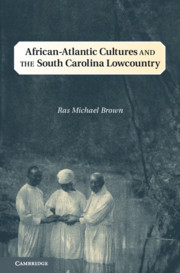And the Winner Is...
 Edward J. Blum
Edward J. BlumLots of wonderful books winning fantastic awards these days (congratulations Matt Hedstrom for the well-deserved Brewer Prize!). And here is an announcement from the new Journal of Africana Religions:
 Journal of Africana Religions Announces “Albert J. Raboteau Book Prize” Winner
Journal of Africana Religions Announces “Albert J. Raboteau Book Prize” WinnerMonday, August 5, 2013
Evanston, IL – The Journal of Africana Religions announced today that Michael Brown’s African-Atlantic Cultures and the South Carolina Lowcountry (Cambridge University Press, 2012) has been selected to receive the 2013 Albert J. Raboteau Book Prize for the Best Book in Africana Religions.
This award is given each year to an academic book that exemplifies the ethos and mission of the Journal of Africana Religions, an interdisciplinary journal that publishes scholarship on African and African diasporic religious traditions. Albert J. Raboteau, for whom the prize is named, is author of the classic Slave Religion: The Invisible Institution in the Antebellum South, a book that has made a lasting impact in the field of Africana religions. To become eligible for the award, books must be nominated by an academic publisher, and a prestigious five-member committee is responsible for assessing these nominations and determining a winner. The selection, thus, is international in scope and highly competitive.
Brown’s book examines perceptions of the natural world revealed by the religious ideas and practices of Africa's Kongo region and among African-descended communities in South Carolina from the colonial period into the twentieth century. Brown is an Associate Professor in the History department and the Africana Studies department at the University of Southern Illinois, Carbondale. African-Atlantic Cultures is his first book.
The Journal's founding co-editors, Edward E. Curtis IV and Sylvester A. Johnson, were quite positive about the book prize. “We are very excited to learn of the committee's decision. They described Brown's book as a model of erudition,” said Curtis and Johnson. “Most religious studies scholarship still devotes too little attention to Africana religions. So, we think it is especially important to recognize outstanding work in this field." Curtis teaches at the Indiana University School of Liberal Arts, Indianapolis; Johnson is at Northwestern University.
Reflecting on Professor Raboteau’s work, in whose honor the prize was named, they both emphasized that a range of pioneering scholars aspired more than a half-century ago to produce scholarship and train professional researchers in the intellectual study of religion among African and African-descended peoples. "Professor Brown’s book certainly advances this aim," they agreed. Of added significance for Professor Brown is the fact that the 2013 award, which recognizes a book published in 2012, is the inaugural book prize. "Professor Brown should take special note of the committee’s assessment that his scholarship is an especially keen contribution to this larger enterprise of studying Africana religions."
The journal receives support from the Indiana University School of Liberal Arts-Indianapolis and Northwestern University’s Weinberg College of Arts and Sciences. It is housed at Northwestern University’s Department of African American Studies.

Comments